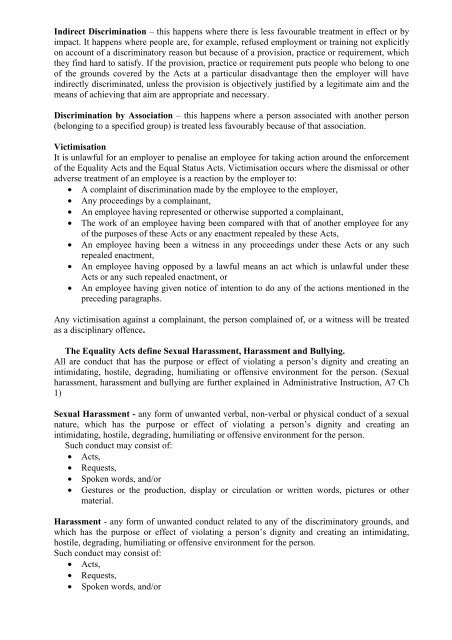Defence Forces Equality, Diversity, and Equal Status Policies 2007
Defence Forces Equality, Diversity, and Equal Status Policies 2007
Defence Forces Equality, Diversity, and Equal Status Policies 2007
Create successful ePaper yourself
Turn your PDF publications into a flip-book with our unique Google optimized e-Paper software.
Indirect Discrimination – this happens where there is less favourable treatment in effect or by<br />
impact. It happens where people are, for example, refused employment or training not explicitly<br />
on account of a discriminatory reason but because of a provision, practice or requirement, which<br />
they find hard to satisfy. If the provision, practice or requirement puts people who belong to one<br />
of the grounds covered by the Acts at a particular disadvantage then the employer will have<br />
indirectly discriminated, unless the provision is objectively justified by a legitimate aim <strong>and</strong> the<br />
means of achieving that aim are appropriate <strong>and</strong> necessary.<br />
Discrimination by Association – this happens where a person associated with another person<br />
(belonging to a specified group) is treated less favourably because of that association.<br />
Victimisation<br />
It is unlawful for an employer to penalise an employee for taking action around the enforcement<br />
of the <strong><strong>Equal</strong>ity</strong> Acts <strong>and</strong> the <strong>Equal</strong> <strong>Status</strong> Acts. Victimisation occurs where the dismissal or other<br />
adverse treatment of an employee is a reaction by the employer to:<br />
• A complaint of discrimination made by the employee to the employer,<br />
• Any proceedings by a complainant,<br />
• An employee having represented or otherwise supported a complainant,<br />
• The work of an employee having been compared with that of another employee for any<br />
of the purposes of these Acts or any enactment repealed by these Acts,<br />
• An employee having been a witness in any proceedings under these Acts or any such<br />
repealed enactment,<br />
• An employee having opposed by a lawful means an act which is unlawful under these<br />
Acts or any such repealed enactment, or<br />
• An employee having given notice of intention to do any of the actions mentioned in the<br />
preceding paragraphs.<br />
Any victimisation against a complainant, the person complained of, or a witness will be treated<br />
as a disciplinary offence.<br />
The <strong><strong>Equal</strong>ity</strong> Acts define Sexual Harassment, Harassment <strong>and</strong> Bullying.<br />
All are conduct that has the purpose or effect of violating a person’s dignity <strong>and</strong> creating an<br />
intimidating, hostile, degrading, humiliating or offensive environment for the person. (Sexual<br />
harassment, harassment <strong>and</strong> bullying are further explained in Administrative Instruction, A7 Ch<br />
1)<br />
Sexual Harassment - any form of unwanted verbal, non-verbal or physical conduct of a sexual<br />
nature, which has the purpose or effect of violating a person’s dignity <strong>and</strong> creating an<br />
intimidating, hostile, degrading, humiliating or offensive environment for the person.<br />
Such conduct may consist of:<br />
• Acts,<br />
• Requests,<br />
• Spoken words, <strong>and</strong>/or<br />
• Gestures or the production, display or circulation or written words, pictures or other<br />
material.<br />
Harassment - any form of unwanted conduct related to any of the discriminatory grounds, <strong>and</strong><br />
which has the purpose or effect of violating a person’s dignity <strong>and</strong> creating an intimidating,<br />
hostile, degrading, humiliating or offensive environment for the person.<br />
Such conduct may consist of:<br />
• Acts,<br />
• Requests,<br />
• Spoken words, <strong>and</strong>/or
















